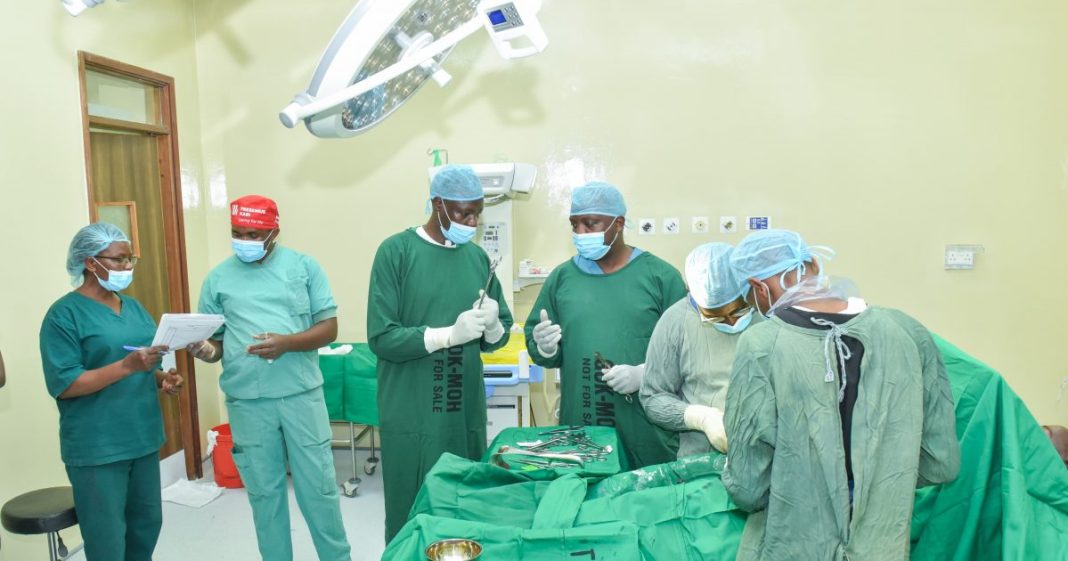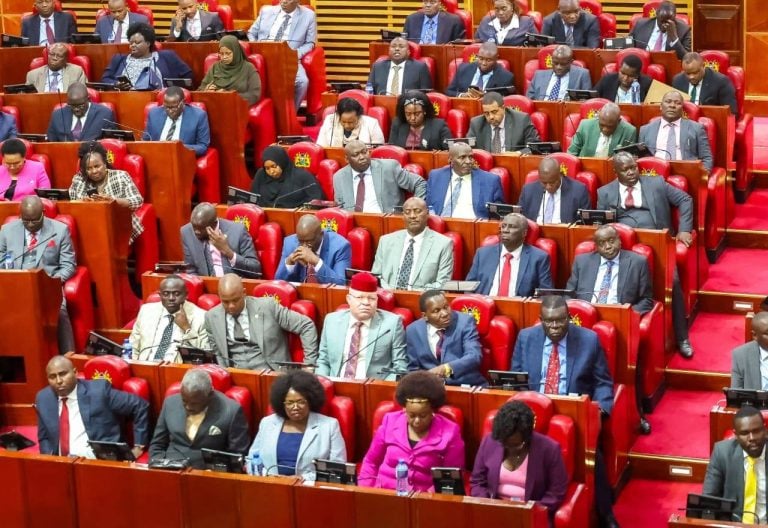A growing number of specialist doctors are shifting from Nairobi’s busy city center to satellite towns like Kikuyu, Juja, Thika, Kiserian and Muthiga in Kiambu County, where demand for affordable healthcare is rising rapidly.
One such doctor is Dr. Mary Wanjiku, a consultant gynaecologist and obstetrician, who set up her clinic in Muthiga less than a year ago. She says the move was driven by the “obvious need” for specialist care in the area.
“I’ve seen this place grow. Patients come from Kikuyu, Kangemi and even Westlands in search of a gynaecologist. But there was nowhere they could just walk in and be treated,” she told Kiambu TV.
Kenya’s health system remains overstretched. According to the 2023 Health Labour Market Analysis, the country has just 13,000 doctors, of which fewer than 5,000 are specialists. This translates to roughly one doctor for every 5,000–6,000 people — far below the recommended ratio of one doctor for every 1,000 citizens.
The Kenya Medical Practitioners and Dentists Council further notes that most specialists are concentrated in Nairobi, Mombasa, Kisumu and Eldoret, leaving peri-urban and rural areas underserved.
Satellite towns like Muthiga, however, are attracting doctors due to rising populations, affordable land and growing middle-class demand. Dr. Wanjiku’s clinic offers services ranging from antenatal care and deliveries to fibroid operations, menopause management, fertility testing and cancer screening. For highly specialized treatments such as IVF, she refers patients to larger hospitals.
Patients say the convenience is a game-changer. “The queues in Westlands were long. Here, I get seen quickly and save both money and time,” said Esther, a Muthiga resident.
Yet, the financial realities of running suburban clinics remain tough. Many rely on cash-paying clients, with doctors often hesitant to accept insurance due to lengthy claim settlement delays.
Experts warn that while suburban clinics improve access, they cannot alone fix Kenya’s shortage of specialists. Investment in training, retention and incentives is needed to expand universal healthcare.
For Dr. Wanjiku, the goal is simple: to provide dignified care close to home. “If a woman can walk in, be seen and leave knowing she’s been cared for, then we’ve done something important,” she said.







[1732]Experience the best inPlay online slots and casino games in the Philippines. Secure inPlay login, quick register, and easy app download for premium gaming. Join inPlay for the best online slots and casino games in the Philippines. Access secure inPlay login, quick register, and easy app download for premium gaming. visit: inPlay
online casino accepts paypal us
References:
didiaupdates.com
usa casino online paypal
References:
https://linktree.biz/broderickr
The Seattle Times reported in early September 2015 that Microsoft had hired architecture firm Skidmore, Owings &
Merrill to begin a multibillion-dollar redesign of
the Redmond campus, using an additional 1.4 million square
feet (130,000 m2) allowed by an agreement with the City of Redmond.
In 2009, a shopping mall called “The Commons” was completed on the campus, bringing 1.4 million square feet (130,000 m2) of retail space, as well as
restaurants, a soccer field and pub to the West Campus.
It is estimated to encompass over 8 million square feet (740,000 m2) of office space and 30,
000–40,000 employees. The all-electric buildings are
completely fossil-fuel free, drawing renewable energy from off-site sources
and the campus’s Thermal Energy Center, which houses a geothermal system that provides heating and cooling for
18 buildings. At the heart of the new section lies a two-acre
(0.8 ha) plaza that can host events and gatherings for both
employees and the public.
Microsoft partnered with Sound Transit and the City of
Redmond to fund a pedestrian bridge connecting the light rail station to
both sides of its campus to open in 2020, providing $33.3 million of the cost.
The transit center opened in 2002 and will be
the eastern terminus of the East Link light rail extension, scheduled to open in 2023.
The campus is located on both sides of the State Route 520 freeway,
which connects it to the cities of Bellevue and Seattle as well as
the Redmond city center. In January 2006, Microsoft announced the purchase of Safeco’s Redmond campus after the company had
begun consolidating its offices at the Safeco Tower in Seattle’s University District a year
earlier. Microsoft initially moved onto the grounds of the campus on February 26, 1986, weeks before
the company went public on March 13. By adding native and
adaptive vegetation, using rainwater capture for toilet flushing, and installing efficient fixtures and irrigation, the campus is projected to save more than 20 million gallons of water each year.
The shuttles, which began operating in 2007, were targeted in early 2014 as a symbol
of gentrification in similar fashion to the Google bus protests in San Francisco, California that same year.
The campus is served by buses to Seattle and some Eastside cities at
the Overlake Transit Center, operated by Sound Transit and King County Metro.
The campus was originally leased to Microsoft from the Teachers Insurance and Annuity Association, a
pension fund manager, until it was bought back in 1992. Construction began on August 9, and Microsoft moved into the $25
million facility on February 26, 1986, several weeks before
the company’s initial public offering. Microsoft chose to move its headquarters from Bellevue to nearby Redmond
in January 1985, selecting a 29-acre (12 ha) plot of land that would be developed by Wright Runstad & Company.
References:
https://blackcoin.co/online-casino-games-overview/
By this, we mean that it is possible to find at least one new offer
from one of these casinos every day. The casino rewards
you with free spins or cash for the initial use of the site and the games provided.
Use tools to control your gambling, such as deposit limits or self-exclusion. Now for a luxurious take at one of the top casinos in Australia
— Crown Melbourne. The rewards are also plentiful for players that stick around,
and the entertainment never ends. That includes the outside of
the casino itself — it may not look like much during the day, but the whole area comes alive as soon as the sun sets over the horizon.
Each platform in our list has been tested for security, fairness, and player experience,
ensuring you can enjoy top-quality gaming in a safe and reliable environment.
The world is constantly changing, and the gambling world is not an exception. It
has much more liberal policies concerning gambling transactions
if to take PayPal as a comparison. Neteller has been a major processor of transactions to gambling vendors since early 2000s.
The secret of its popularity is in the 100% protection against
unauthorized payments and the highest level security.
The site is licensed by the Malta Gaming Authority, offering it one of the most renowned seals of approval in the
gambling world. In addition, the platform is well
known for its responsive interface and smooth mobile gameplay.
There are over 7,000 games in the KatsuBet library, with titles from
Evolution, Pragmatic Play and BetSoft forming a large chunk of the catalogue.
References:
https://blackcoin.co/ggbet-casino/
Die Live-Casino-Action hat etwas, das online-Plattformen nur schwer nachahmen können, aber Hit’n’Spin kommt dem schon sehr nahe).
Die Auswahl an mobilfreundlichen Spielen, insbesondere die
online-Spielautomaten, ist erstklassig. 📲👍 Ich habe einen Bonuscode ohne
Einzahlung für einen mobilen Casino-Echtgeldbonus ohne Einzahlung verwendet und es hat ohne
Probleme funktioniert. Da ich nichts zu verlieren hatte, probierte
ich es aus und spielte ein paar Runden Blackjack online mit Spielgeld.
Was wäre ein Online Casino ohne einen verlockenden, üppigen Willkommensbonus?
Zwar gibt es genau das – über 1.500 Spiele, mit denen man sich nicht nur die Zeit versüßen kann,
sondern mit denen man, wenn man möchte, vor allem auch sehr viel gewinnen kann.
Und wir wollten immer mehr als „nur“ viele sehr gute und spannende Casinospiele anbieten. Das betrifft keineswegs nur die Casinoboni, über
die wir hier ausführlich schreiben werden, sondern das gesamte Angebot.
Glücksspiele um echtes Geld werden durch uns nicht angeboten. Die Vertrauenswürdigkeit einer
Casinoplattform ist von entscheidender Bedeutung.
References:
https://online-spielhallen.de/playfina-casino-promo-code-ihr-schlussel-zu-exklusiven-vorteilen/
0bg0zr
39ps30